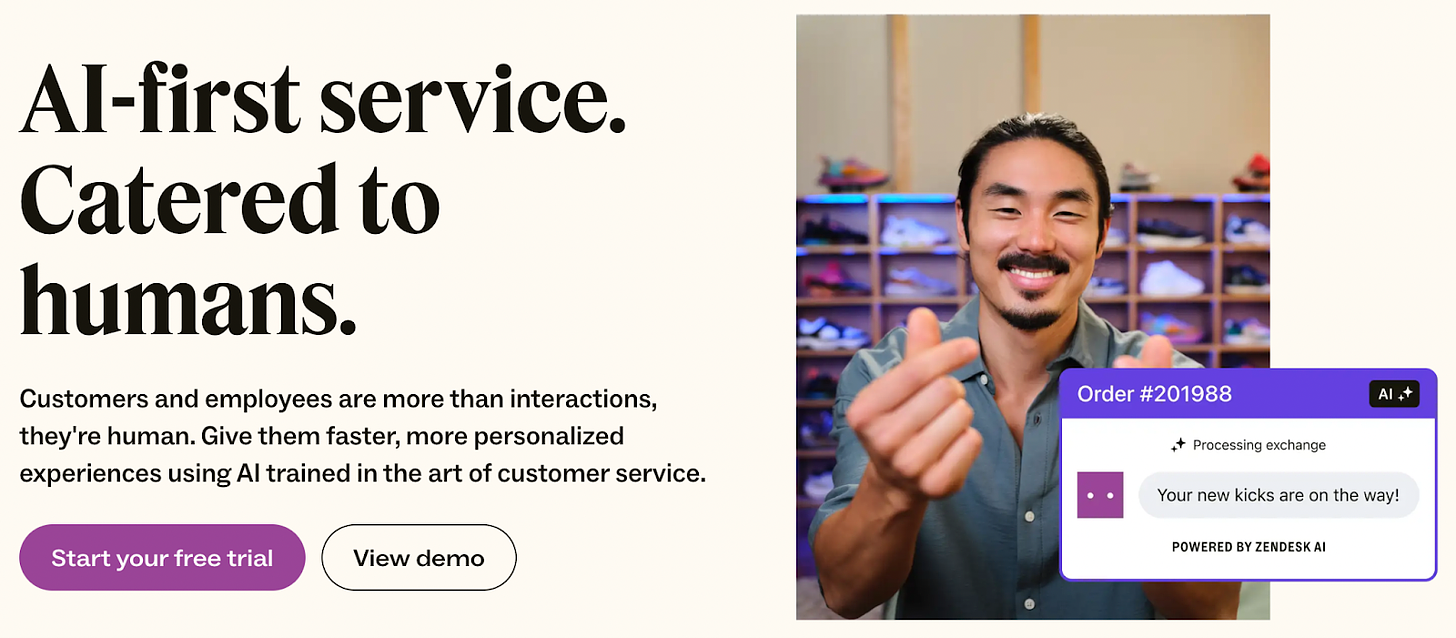Previously on Giuseppe’s Glimpse: In the last episode, we discussed the true essence of value creation, focusing on four key consumer benefits—quality, value, aspiration, and scarcity. If you missed it, catch up here! 🌟
Buongiorno everyone! 👋
Next week, I will have the pleasure of sharing my perspective on the future of customer experience at the largest Italian event organized by Zendesk, a global company that supports over 100,000 businesses worldwide with its AI-powered customer service software.
As I prepared for my talk, I was particularly inspired by an insightful observation from Luciano Floridi, Professor in the Cognitive Science Program and Founding Director of the Digital Ethics Center at Yale University. 🎓
He wisely noted that AI without a business case is merely Research and Development.
I couldn’t agree more.
As someone who believes we’re on the brink of a transformative era, I’ve always held that technology for its own sake doesn’t lead to meaningful change—in fact, it can be risky.
Instead, in order to maximize the benefits of new technologies, we must thoughtfully assess their benefits and drawbacks, their impact on our organizations, and their broader implications for society. 🌟
This is especially true for General Purpose Technologies (GPTs) such as Generative AI (GenAI), which are inherently versatile and capable of reshaping entire industries.
In his Forbes article, Bernard Marr explores the profound impact of AI, particularly GenAI.
He argues that while AI can automate and optimize tasks traditionally performed by humans, it also pushes us to reassess and enhance our uniquely human qualities. 🤝
In his own words “AI will make us even more human”.
Marr emphasizes that in an AI-driven world, our value will increasingly lie in our creativity, empathy, and ability to engage in complex social interactions—skills that machines cannot replicate.
Thus, AI challenges us to not only leverage our technological capabilities but also to deepen our human approach to business, customer engagement, and problem-solving.
Going beyond efficiency
Marr also points out that AI compels us to rethink the very essence of work. 💼
As AI systems take over routine and repetitive tasks, they free up humans to engage in more strategic, innovative, and emotionally intelligent endeavors.
This evolution isn’t just about boosting efficiency; it’s about transforming the workplace into a more dynamic, human-centered environment where technology and humanity complement each other.
However, we often view GenAI primarily through the lens of efficiency, aiming to enhance profitability by cutting costs and streamlining operations. 💰
While important, this focus on the bottom line only captures part of AI’s potential.
If we see AI merely as a tool to make existing processes more efficient, we risk overlooking a far greater opportunity: GenAI can be a powerful driver of top-line growth by opening up new avenues for business and innovation.
Rather than simply optimizing what we already do, GenAI offers the potential to revolutionize business models and value creation strategies, enabling us to engage customers, develop products, and deliver services in ways previously unimaginable. ✨
By leveraging AI to explore alternative business models, we can reshape our industries and unlock opportunities that were once out of reach.
For instance, think about how AI can facilitate hyper-personalized experiences that were previously impossible to deliver at scale.
Or consider how it can enable the creation of entirely new business ecosystems, where predictive insights, real-time decision-making, and automated processes generate value in ways we’ve yet to fully envision. 🔮
In this sense, AI is not just a tool for operational efficiency but a catalyst for innovation and growth.
Transforming customer experience
This shift is especially significant in customer experience, where AI is redefining how businesses connect with their clients.
After just five minutes of exploring Zendesk’s website, it became clear that in the coming years, GenAI will revolutionize every facet of customer service—from tailoring interactions to boosting team efficiency. 🚀
Consider the example of WhiteWall, a premium photo printing service.
With Zendesk’s support, WhiteWall manages high ticket volumes—6,000 to 12,000 requests monthly—across the globe with just ten support agents, all while maintaining an impressive customer satisfaction rate of 80-85% (CSAT).
Through the use of AI, WhiteWall has observed a reduction in response time by around 30 seconds and as much as a 90-second decrease with its partner service. ⏱️
These improvements highlight AI’s role in saving time and reducing costs, especially for complex inquiries requiring detailed responses.
Another compelling example is Liberty London, a prestigious UK retailer that partnered with Zendesk to elevate its customer service. 🛍️
By using AI to categorize and tag incoming inquiries, Liberty London could efficiently route complex issues to the most appropriate agents, slashing response times by 73%.
This targeted AI deployment not only boosted efficiency but also significantly enhanced customer satisfaction, proving a strong business case for AI in customer service.
What all business leaders need to ask themselves
As we look to the future, it’s essential that we, as business leaders, not only embrace AI’s capabilities but also ground our enthusiasm in sound business logic. 🔍
We must look beyond merely weighing the pros and cons of GenAI or assessing its potential risks and opportunities.
Instead, it's crucial to focus on the key questions surrounding its implementation and the associated business cases. 💡
Here are some important considerations for implementing GenAI:
🔷 What is the actual Return on Investment (ROI) for my company?
🔷 Do we have the right resources, processes, and values to harness this transformation?
🔷 What are the critical investments needed?
🔷 What can we reasonably expect in the short and medium term?
🔷 Can we afford to invest now and wait for the forecasted results?
The successful integration of GenAI into an organization relies on our ability to strategically align technology with clear business objectives. 🎯
Only then can we ensure that AI transcends buzzword status to become a powerful tool that drives real value for our organizations and customers alike.
What’s your take on this topic? What steps are you taking to align AI with your broader strategic goals? How will you gauge success beyond efficiency? Where can you be more ambitious in using AI to innovate? 💬
Stay curious! 🙌
-gs
For more thoughts on this topic, feel free to check out my previous newsletter, Tech is Cool. People are Warm.
Learn more about Zendesk’s event by clicking here! Join me there and discover how to seamlessly integrate AI into your business. 💫
Oh, wow! You made it to the end. Click here to 👉 SHARE this issue with a friend if you found it valuable.








